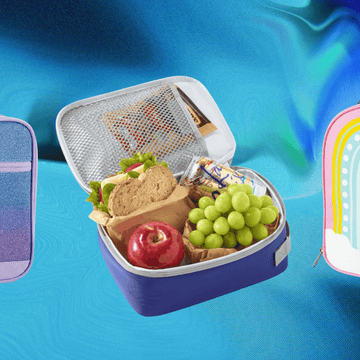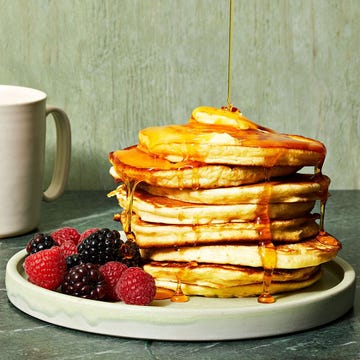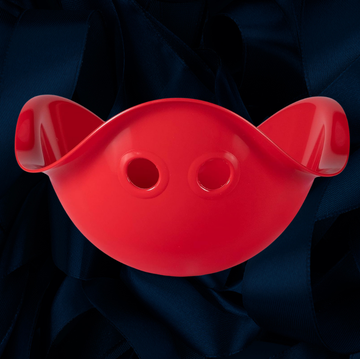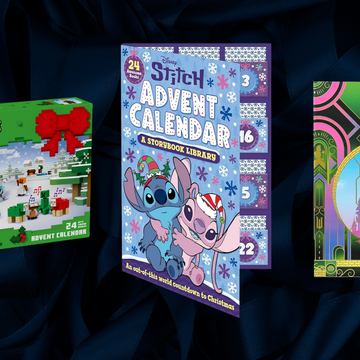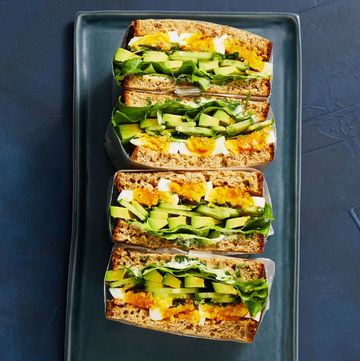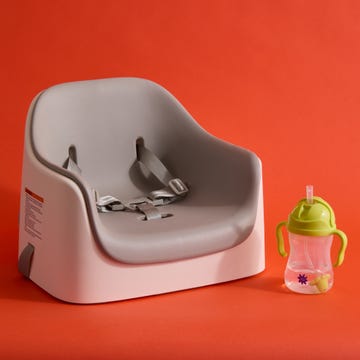As most parents know, snacks are a big deal in kids' eyes. They're also important for their health. "Adults can get all their nutrients in their three main meals, but kids have smaller tummies and may not get everything they need in breakfast, lunch and dinner," says Marina Chaparro, R.D.N., a pediatric dietitian, founder of Nutrichicos and creator of the Feeding Toddlers with Confidence online course.
While it's easier to stock up on pre-packaged bags of cookies and chips, preparing fresh snacks for your kids from whole foods can pay off big time. Just like adults, kids need plenty of protein, carbs and fat for energy, as well as minerals and the alphabet of vitamins for good immunity and cellular growth and function.
To help get your kid excited about these snacks (and maybe even save you a little time), invite them in the kitchen. "We sometimes underestimate how much kids really want to be involved in the process, both shopping for the snacks and preparing them," says Chaparro. Ask your child to pick out which fruits look the best at the market or to help make a frozen yogurt pop.
Next time your little one’s tummy starts to rumble, offer them one of these healthy snacks for kids.
Jump to:
- Edamame
- Freeze-dried fruit
- Homemade muffins
- Cottage Cheese
- Mango Slices with Lime
- Yogurt Popsicles
- Cheese and Crackers
- Olives
- Frozen Fruit Sticks
- Crunchy Chickpeas
- Trail Mix
- Tomatoes and Cheese
- Homemade Fries
- Celery and Nut Butter
- Veggie-Based Chips
- Oatmeal
- Popcorn
- Smoothie
- Turkey Roll Up
- Fruit and Nut Butter
- Hummus and Veggies
- Toast
- Eggs
- Chips and Guac
- Pistachios
- Seaweed Snacks
- Tuna and Crackers
- Veggies and Dip
Edamame
Once a treat you could only order in sushi restaurants, edamame are now available in just about every grocery store across the country — and they're a big hit with little kids. "They are so much fun for kids to eat," says Chaparro. "If you serve it in the pod, your kids can play with it, open it, and see what's inside, like a little experiment." She adds that the soy beans, which you can serve frozen, heated in the microwave or even roasted, are packed with fiber and protein, which will leave them more satiated during activities.
Freeze-dried fruit
As crunchy as a cookie but made of nothing more than wholesome, vitamin-packed fruit, this popular new type of snack is available at many grocery stores. Chaparro is a big fan of strawberry and mango, "This is a different way of serving fruit that is mess-free, packs really well and doesn't have to be stored at a colder temperature," she explains. Plus, the fruit has plenty of vitamin C, potassium and fiber and makes an especially easy grab-and-go snack.
Homemade muffins
What kid doesn't love standing at the kitchen counter helping Mom or Dad mix up tasty muffin batter? The trick with these is to add healthy, wholesome ingredients, such as grated zucchini or carrots, and mix in what Chaparro calls "nutrient boosters," such as flaxseeds, chia seeds or hemp seeds. If your kid likes cute, easy-to-munch snacks, make them mini-style. Go for the full-size ones if you want them to double as an on-the-go breakfast, Chaparro suggests.
Cottage Cheese
Yes, cottage cheese cool again. Thankfully, it's also nutritious. It’s creamy and satisfying and will give your little ones a healthy hit of protein, calcium, vitamins and a bit of fat. Need a reco? Good Culture tastes amazing, is made from only real ingredients and contains live and active cultures. Whatever brand you choose, you can always mix in some fresh fruit for a bit of sweet fiber.
Mango Slices with Lime
A popular snack across Latin America (and on street corners in New York City!), mango slices sprinkled with lime juice, salt and — if your kids have adventurous taste buds — a little bit of spicy tajin, is perfectly sweet and tangy. While especially refreshing in the summer, you can really prep this snack any time of the year.
Yogurt Popsicles
Take this classic kid snack — deliciousness on a stick! — and add an extra boost of calcium and protein by starting with a creamy yogurt base rather than fruit juice. "I like to use a full-fat, plain yogurt and then add in any fruit, a little bit of agave and maybe even sprinkle a little chia," says Chaparro. Ask your kids which fruit and fillings they want and let them help mix the yogurt and pour it into the popsicle molds.
Cheese and Crackers
This beloved snack is the kids’ version of adult charcuterie boards, and the pairing happens to make an ideal healthy snack. Look for whole grain crackers or ones made from nuts and seeds to be sure they’re getting some fiber and nutrients instead of just refined white flour, and consider making your life easier by keeping portable or snack size cheese products.
Olives
Some people don't develop a taste for these little Mediterranean tidbits until they are adults at a cocktail party, but plenty of kids love popping the salty treats in their mouth at snack time. They'll provide your kiddo a dose of healthy fats and you might even have luck if you introduce them with the aforementioned crackers and cheese. Note: Olives are a potential choking hazard, so be sure to either cut them or make sure your child is of age to eat them.
Frozen Fruit Sticks
“Skewer up to three pieces of fresh fruit on a popsicle stick or toothpick, then stick ‘em (and store ‘em) in the freezer. Once frozen, serve with coconut chips or cashews,” suggests
Jaclyn London, M.S., R.D., C.D.N., an NYC-based nutrition consultant, the author of Dressing on the Side (and Other Diet Myths Debunked) and the host of the podcast On the Side with Jackie London, R.D. “It’s like enjoying a fruit pop!” Frozen fruit works too, just let it thaw a tad before skewering. Your child will get a variety of vitamins and minerals alongside a bit of fat, protein and fiber.
Crunchy Chickpeas
Crisp up some chickpeas in the oven or an air fryer, then sprinkle with your favorite savory or sweet spices. “Roasted pulses like chickpeas are easy to make, tasty and have protein and fiber to stave off afternoon cravings,” London says. No time to make your own (or just not interested!)?
Trail Mix
If your kid isn’t allergic to nuts and seeds, trail mixes are fun snack options. They deliver fiber, protein and fat — the energy trifecta! Add some dried fruit (look for products with no added sugar) to the mix for an extra hint of natural sweetness.
Tomatoes and Cheese
Just call them pizza snacks, and your child will probably be on board! Pair grape or cherry tomatoes (or large tomatoes cut into slices or chunks, if that’s how they like them) with part-skim string cheese. “Cheese packs 5 to 8 grams of protein, which helps keep kids fueled and energized better than high-carb snacks that cause blood sugar spikes and then a crash,” London says, and tomatoes serve up important vitamins and antioxidants.
Homemade Fries
Try throwing jicama or sweet potato slices in the air fryer or on a sheet pan in the oven. Jicama is like a cross between a potato and an apple, and it has a neutral flavor, so your kid will never know they’re dunking a dose of vitamin C, iron, magnesium, B-vitamins into their favorite fry condiment. Meanwhile, sweet potatoes are filled with antioxidants like beta-carotene (which gives them their color), vitamins and fiber.
Celery and Nut Butter
Celery sticks topped with peanut butter and raisins (the classic "ants on a log" snack) is a snack that's stood the test of time — and for good reason. The trio contains satiating fiber, fat and protein with a bit of sweetness.
Veggie-Based Chips
You can air fry pretty much any vegetable to create your own veggie snack that has the fiber and nutrients most packaged ones lack (try frozen corn or peas, too!). But if you’re really short on time, here are London’s go-to brands for convenience, flavor and nutrition: Jackson’s sweet potato kettle chips, Harvest Snaps (made from snap peas), Hippeas (made from chickpeas), PeaTos (made from pulses) or Love Corn (crunchy flavored corn niblets).
Oatmeal
Whole grain goodness, plus protein and fiber make this breakfast staple an equally smart snack for kids. Skip the single serve oatmeal packs (they’re often filled with excess sodium or sugar) and keep some overnight oats in the fridge for a grab-and-go snack. Top with berries (always a kid favorite!) and nuts for extra sweetness and crunch.
Popcorn
Surprise! This movie night treat also makes a fabulous healthy snack for kids because it’s loaded with vitamins, antioxidants and fiber. Your best bet is to make it yourself (this allows you control over how much salt or butter you use), or you can choose a brand such as SkinnyPop, Pipcorn, Smartfood or Angie’s BOOMCHICKAPOP. “When you’re looking for a cheese-flavored popcorn, make sure real cheese is listed on the ingredients list,” London says. Also, pay attention to how much sugar is in sweetened popcorn flavors. Note: Children should be at least four years old before giving them popcorn.
Smoothie
The wonderful thing about smoothies is they're totally customizable and can include a wide range of foods. “This allows you to stealthily sneak in nutrient-dense ingredients like spinach or chia seeds,” London says. You can make smoothies on demand or blend up a batch of your kid's favorite smoothie medley, pour it into an ice cube tray, stick a popsicle stick in each compartment, then freeze them so you always have smoothie pops to save the day.
Turkey Roll Up
It’s sandwich vibes in snack form, and we’re here for it. Wrap a slice of deli turkey (kudos if it’s a lower sodium variety) around your kids’ favorite veggies and a slice of cheese and let them munch away! They’ll get a fun snack filled with protein, vitamins and minerals.
Fruit and Nut Butter
Banana and peanut butter, apple or pear slices and almond butter — you can’t go wrong with a savory-sweet duo. And it offers the key components of a healthy snack for kids: protein, fiber, fat along with vitamins and minerals, says London.
Hummus and Veggies
It’s never too early to cultivate their love for hummus — a nutritious way to make vegetables fun. Alongside their favorite dippers (celery, carrots, cucumbers, cherry tomatoes), try introducing other veggies like bell peppers, cauliflower, broccoli, even radishes or jicama!
Toast
Adults love their brunch toasts, and there’s no reason kids shouldn’t too. In fact, it can make for a great healthy snack. Toast up a slice of whole grain bread, then experiment with toppings: hummus and cucumber slices, cream cheese and tomato, nut butter and blueberries, there are so many good-for-you options!
Eggs
No, we don’t expect you to scramble up cheesy eggs or execute an omelet whenever your child begs for a snack. But hard boiled eggs are an easy option, and you can make them more exciting by halving and sprinkling with a pinch of salt and pepper, everything bagel seasoning or any other spice that they’ll eat.
Chips and Guac
Yep, you read that right! Your favorite app also makes for a healthy snack. “Wholly Guacamole makes single-serve packs, and look for a brand of chips with whole grains or a real vegetable on the ingredient list (plus oil and salt — the fewer ingredients the better), like Food Should Taste Good or Siete, made from cassava flour,” London says. Even better — see if your child will dip veggies and chips.
Pistachios
This tasty nut might not be popular among the kids — yet! Try the pre-shelled snack packs from Wonderful Pistachios, which come in fabulous flavors that the whole family will love. Pistachios boast antioxidants alongside the snack-friendly mix of protein, fiber and fat.
Seaweed Snacks
You’d be surprised how many kids will chow down on crispy seaweed snacks. “They’re crunchy and flavorful while also providing key vitamins and minerals that are important for kids’ growth and overall energy levels" London says. Try gimMe Organic roasted seaweed.
Tuna and Crackers
If your kid is a tuna lover, pat yourself on the back, then offer it as a healthy snack. When it’s not made with globs of mayo, it makes for a low fat, protein-rich nibble. To cut back on saturated fat, try doing a mix of mayonnaise and low-fat Greek yogurt (or all Greek yogurt, if you can swing it!), and stir in minced veggies like celery, bell pepper or even carrots. Let them pile it on whole grain crackers or whole wheat pita triangles.
Veggies and Dip
Most kids love dip. Fortunately, it’s a great way to encourage vegetables and it’s easy to prep in a flash. And get this: You can also almost always find a veggie dip snack pack when you’re out and about.

Valerie Agyeman (she/her) is a women's health dietitian and the host of the Flourish Heights podcast, where she produces science-driven content covering overlooked nutrition, wellness and women’s health topics. She has over 10 years of combined nutrition communications, corporate wellness and clinical nutrition experience. Valerie is a trusted expert in the media, regularly appearing on networks such as Fox 5 DC, PIX-11, and ABC’s Good Morning Washington. She is also a contributing expert to publications like Women’s Health Magazine, Prevention, Good Housekeeping, and The Everygirl.

